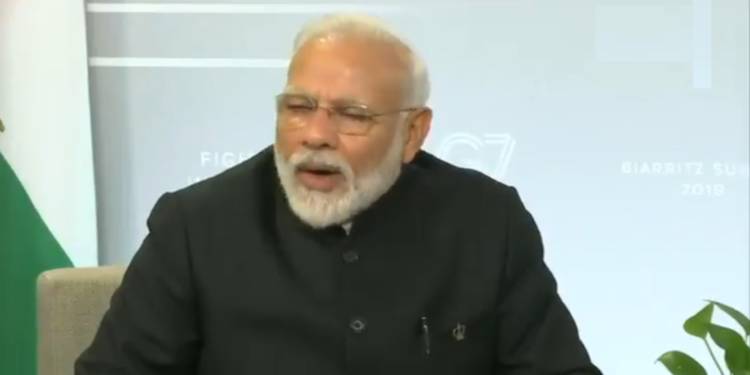In the first crucial foreign tour after India’s move to abrogate several discriminatory provisions of the Article 370 and bifurcate the erstwhile state into two union territories, PM Modi has not only unequivocally reiterated India’s position on the issue but also firmly signaled the international community to keep their nose out of India’s internal issues and all other bilateral issues between India and Pakistan.
During a meeting with US President Trump on the sidelines of the G7 summit in France, PM Modi in a 26 seconds long statement said “There are many bilateral issues between India and Pakistan, and we don’t want to trouble any third country. We can discuss and resolve these issues bilaterally,” Donald Trump not only endorsed India’s position but also claimed that “he (PM Modi) has it under control”.
#WATCH: Prime Minister Narendra Modi during bilateral meeting with US President Donald Trump at #G7Summit says,"All issues between India & Pakistan are bilateral in nature, that is why we don't bother any other country regarding them." pic.twitter.com/H4q0K7ojZT
— ANI (@ANI) August 26, 2019
The significance of these statements is further increased considering the backdrop of the ongoing disturbances in Pakistan opposing the legislative developments in the Indian erstwhile state of Jammu and Kashmir. Earlier in July after a bilateral visit to the USA, Pakistani PM Imran Khan had claimed a massive diplomatic victory and Trump’s vacuous slip regarding the mediation of the Jammu and Kashmir issue was just a cherry on the top.
While India had then reacted firmly and reiterated its stand of bilateral resolution of all outstanding issues between the two neighbors, these statements from PM Modi on a global platform certainly carry weight and along it with the inherent global impact. USA, Russia, France and all other major nations including India’s neighbors Sri Lanka, Afghanistan, Bangladesh and others have already decisively endorsed India’s stand, the only major nation coming to the support of Pakistan is China and these comments from PM Modi are certainly well suited to caution China against any unwarranted interference in issues pertaining to India’s sovereignty and foreign policy interactions.
For Pakistan, the efforts to involve the International community in the ‘dispute’ have surely backfired. As no progressive nation wants to align its interests with Pakistan, the rogue nation is even struggling to appeal to the ‘Muslim Ummah’ which it has banked on for long. While Pakistan was surely hopeful to get assistance or even just moral support from nations in the Islamic world like UAE which had earlier helped the Pakistani economy or whatever is left of it out of a balance of payment crisis but instead, UAE contrary to Pakistani expectations not only endorsed India’s position on the issue but also awarded PM Modi their highest civilian award the ‘Order of Zayed’. Along with UAE other nations including Saudi Arabia, Bharain, Afghanistan, Maldives, and Palestine have also reiterated their trust in India and PM Modi.
Moreover Pakistan has been trying to portray this issue as a religious struggle between Hindus and Muslims. Gulf Islamic nations by their support for India have not only snubbed the terror infested nation but also rejected all the subversive theories around the anti-Muslim image of the current ruling dispensation in India. Muslim majority nations coming out against Pakistan surely indicates a major shift in International perspective regarding India and Pakistan.
Foreign diplomatic relations, which are inherently slow paced, require constant struggle against the status quo, however India’s pragmatic and proactive approach in this respect has beared swift positive results for Indian diplomatic efforts. India’s friendly relations with West Asian nations is a striking example and now India commanding support and respect of major world powers without compromising on its sovereignty surely marks the beginning of a new chapter in India’s foreign policy.



























